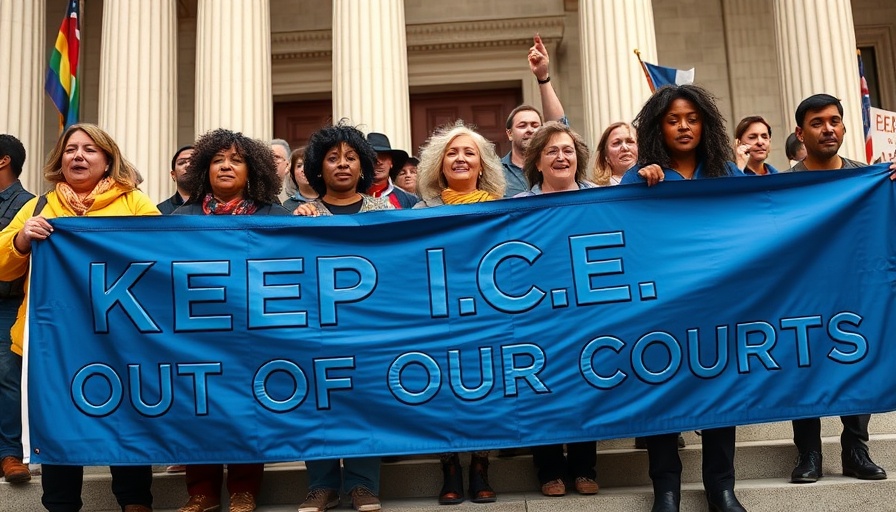
ICE’s New Policy: What You Should Know
In a significant shift to its operational guidelines, Immigration and Customs Enforcement (ICE) has rescinded its requirement for agents to avoid violating state and local laws when conducting arrests at courthouses. This decision, quietly made without public announcement, is indicative of a broader trend towards increased autonomy for federal agents in enforcement operations.
The previous policy mandated that ICE consult with legal advisers before taking action, ensuring that local laws were respected. However, the newly implemented guidance empowers agents to make these critical decisions independently, heightening the risk of legal disputes and potential unrest in communities that already grapple with heightened tensions around immigration law enforcement.
The Broader Implications of Courthouse Raids
This policy change is not merely a procedural update; it signals a more aggressive stance by ICE, reflective of the hardline enforcement measures that were hallmarks of the previous administration. The impacts of this decision could reverberate through local communities, particularly as courthouse arrests have become more prominent.
Recently, ICE has made headlines by targeting immigrants during routine court hearings, a move openly supported by former President Trump, who characterized it as a significant part of his administration's larger deportation campaign. As ICE ramps up its operations, it raises important questions regarding local governance and the boundaries of federal law enforcement's reach.
Local vs. Federal: Tensions on the Rise
The new policy poses challenges not just to immigrants, but also to local authorities who feel their jurisdiction is being undermined. Emma Winger of the American Immigration Council has criticized the decision as one that essentially disregards state laws, placing unfettered power in the hands of ICE agents who may not have the appropriate training or understanding of local legal frameworks.
This erosion of local autonomy is a crucial concern for communities that advocate for civilian oversight and responsible law enforcement. The potential for increased arbitrary arrests underscores a chilling atmosphere for those navigating the justice system.
Public Response and Potential Backlash
As ICE operations draw criticism and protests grow in size and intensity, public sentiment is becoming increasingly vocal against such policies. The removal of protective oversight encourages fear and fuels unrest, prompting many activists and community leaders to express their dissent and push back against what they perceive as unwarranted federal overreach.
Organized demonstrations have emerged in cities across the United States, amplifying calls for legislation that protects the rights of immigrants and restricts the reach of federal enforcement agencies. The resultant discourse surrounding these issues represents a crucial opportunity for lawmakers to address the concerns of constituents feeling threatened by such potential abuses of power.
Moving Forward: Reputation and Regulations
Experts stress that monitoring the impact of this new ICE policy will be vital in the coming months. With decisions no longer requiring legal consultation, there is room for abuse or misinterpretation of the law as agents exercise greater discretion. Critics worry that this can lead to a slippery slope, where civil liberties are compromised under the guise of enforcement.
As these changes shape the landscape of immigration enforcement, it will be essential for both advocates and civil rights organizations to remain vigilant. Engaging with policymakers and the public will be key to establishing regulations that ensure lawfulness and respect for local statutes.
The Future of Immigration Policy and Enforcement
Looking ahead, the contours of U.S. immigration policy appear more contentious than ever. The ongoing tug-of-war between state laws, local jurisdictions, and federal powers evokes questions about the future path for immigration enforcement.
State governors and local authorities are increasingly asserting their rights to enact legislation that reflects their communities' values. In response to federal policies that override local laws, this resistance could lead to an era of greater division between state and federal governance concerning immigration.
Why Understanding ICE’s Policy Change Matters
Ultimately, understanding the implications of ICE's updated policies is vital for journalists, community leaders, and the general public alike. The equation of safety and legality becomes increasingly complex as federal authority expands without the checks historically provided by local oversight.
It is essential to not just recognize the operational changes but also to critically engage with the broader conversations about civil liberties, immigrant rights, and the ethical considerations surrounding law enforcement practices.
 Add Row
Add Row  Add
Add 




Write A Comment